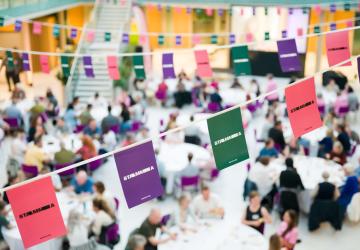
Diary of a helpline volunteer: STAMMAFest 2024
Peter, who volunteers on the STAMMA support services, tells us about the workshops he went to at STAMMAFest, our national conference, which took place in August.
Having attended STAMMAFest 2022 in Liverpool, I was really looking forward to a return 'bout' at Nottingham this year. Unfortunately, one day was all I could clear, so I went for the Friday.
On each of the days there was a plenary in the morning followed by four sets of parallel workshops. There was plenty to choose from and my choice went like this…
Plenary: The Power of One
A really great panel had been compiled to consider and exemplify how it only takes one person to make a difference; to ask, to speak up, to insist. Annette Cmela, Chief Brand Officer at Hidden Disabilities, the internationally recognised scheme that makes the 'sunflower lanyards', told us that it all started when a staff member at Gatwick airport asked how they could support people with non-obvious disabilities. I think we all left the session humbled, encouraged and empowered by what we heard. What a great start to the day!
Workshops
The top 10 research priorities into childhood stammering
Ria Bernard from Action for Stammering Children outlined their study identifying what people who stammer think should be prioritised when it comes to stammering research (due for imminent release). She set out the top 25 priorities they had found, and we were asked to identify our top 10. Have a look at these five I've picked at random:
- What are the long-term outcomes for children and young people who stammer, either with therapy or without therapy?
- Why does a child's stammering vary from day to day, and come and go over the years?
- What are the most effective forms of speech therapy for children and young people who stammer to give the best long term outcomes?
- Does anxiety cause children to develop a stammer?
- What is the most effective therapy and support for pre-school children who stammer?
We were well and truly stunned and impressed by what has been identified, but we totally failed in agreeing a 'top 10' as we all wanted all 25! I for one will be following progress here with interest.
A new lens: the Power Threat Meaning Framework and the mental distress of stuttering
Personally, this session had a profound impact. The journey Cameron Raynes has made from being the quiet one at school, going through events such as not being able to give a speech at his wedding, to coming to terms with and understanding his stammer, is one I well understood. He introduced the 'Power Threat Meaning Framework' (PTMF), and explained how it can help us understand our relationship with stammering. It was empowering and, to someone like me, explained so much.
In a nutshell, instead of asking "what is wrong with you?" (eg when asking about stammering), it focuses on "what has happened to you?" and, crucially (in my case) "how did it affect you?" I reproduce an extract here to explain the next bit, as it's really important: "When it comes to stammering, the PTMF can be particularly insightful. Stammering can be a significant source of mental stress due to societal pressures and personal experiences. The framework helps to understand stammering not just as a speech issue but as a response to various threats and power dynamics in one's life. This perspective can reduce feelings of shame and self-blame, promoting a more compassionate and holistic approach to managing stammering". Read more about the Power Threat Meaning Framework on the British Psychological Society's website.
It is something I am going to look into much more as I feel it may be another way for people to come to terms with their stammer. I just can't wait to talk to some of the speech & language therapists I am fortunate to work with about it.
Let's talk about shame
After talking about 'shame' and the effects of such a strong emotion on people who stammer, hosts Patrick Campbell and Sam Simpson led us into break-out discussions. Similar to the previous workshop, this encouraged us to think about our relationships with stammering differently, supporting and developing our viewpoints, our perspectives. Shame is a powerful human emotion, and I came away from this session appreciating the shame I had felt in the past was as much generated by how others reacted to it. Interestingly for me there were some quite strong links with the 'Power of One' plenary – as there should be!
Wave nature: Understanding emotional speech blocks
I believe this is going to be a 'watch this space' subject. Dawid Tomaszewski and Jakub Bojdol, who run a stammering course in Poland called 'New Speech', gave us an intriguing trip through the model they use. A 'tool for thought' in this approach focuses on a storyboard, a 'rich picture' of events in a journey and asks the participant to consider how these events affect the people shown (you/us).
Of course, in this process, our perceptions are challenged/questioned and in this way, changed, to the benefit of (our) relationships with our stammer. Like many other approaches, it has come from applied experience with Dawid and has enabled Jakub to progress managing his stammer.
Friday night quiz
Well, the quiz is what most of the attendees did on the Friday night. Me? I had a truly GREAT ride home, reflecting on what I had heard and thought, and the people I had met.
STAMMA's support services
I am one of the 40 (or so) volunteers who work on the STAMMA Helpline, webchat and email services. We understand what it is to stammer; most of us stammer and the rest typically have a vocational understanding of it. We are here for you, to listen and to help if we can. Go on, give us a call, a text, an email and we can share some more.
Get news of all our events, including the next STAMMAFest, by becoming a STAMMA member for free.
































